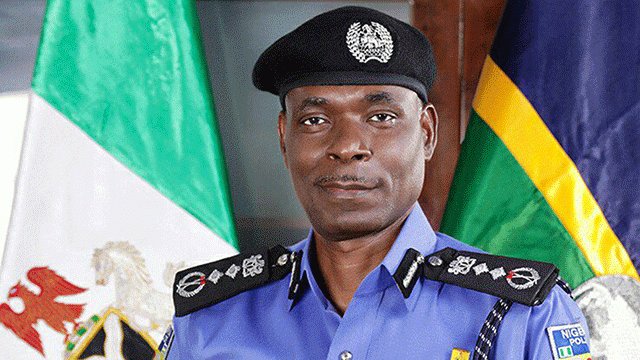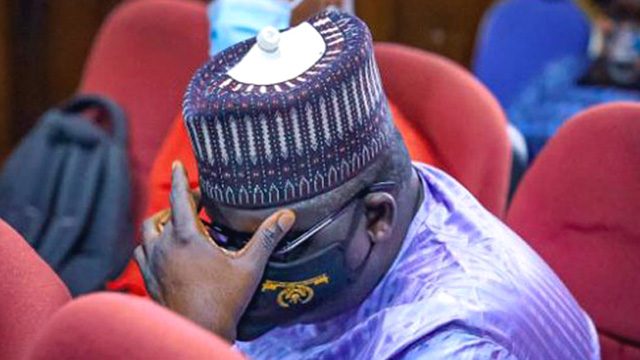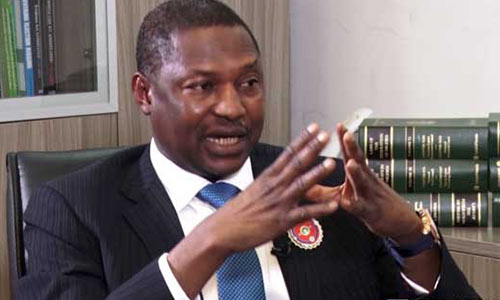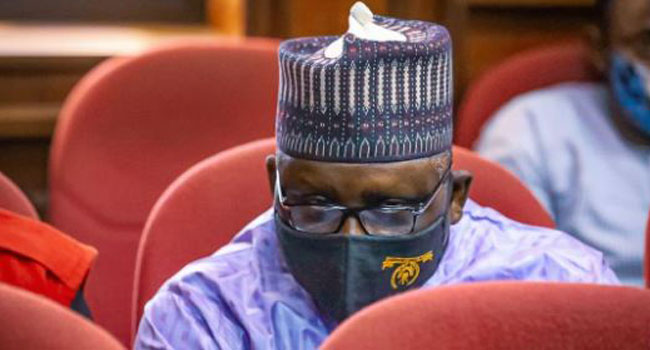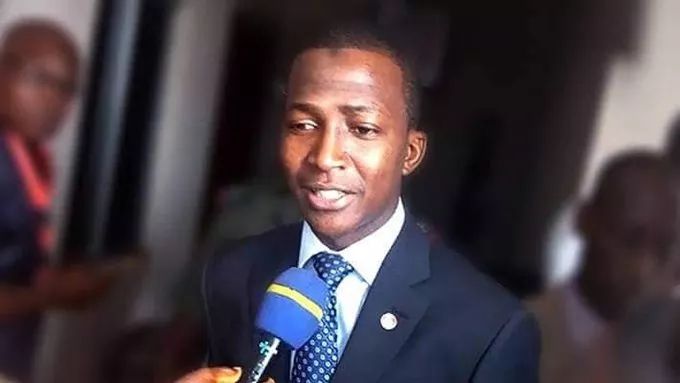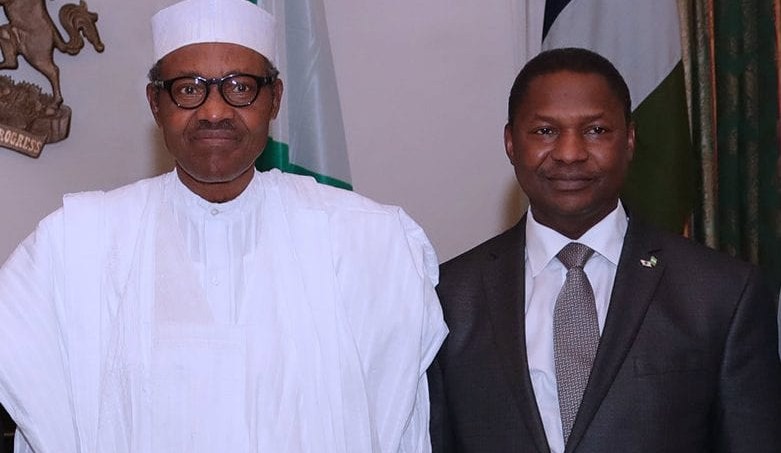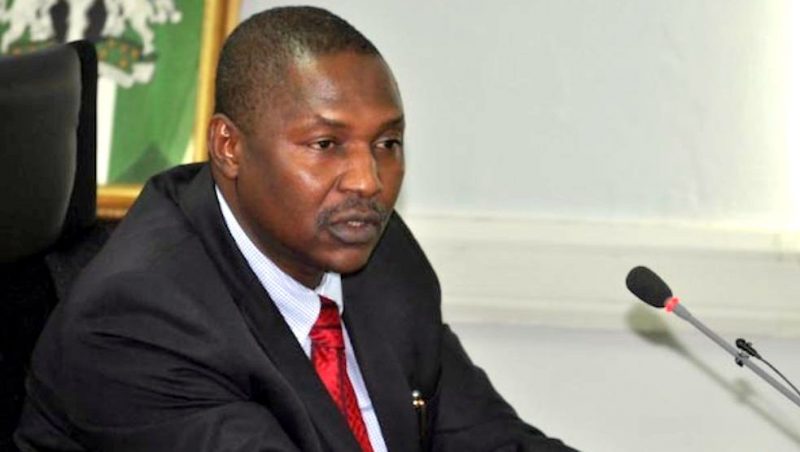President Muhammadu Buhari and the Attorney-General of the Federation(AGF) and Minister of Justice, Abubakar Malami have posited the President was empowered by the Constitution to retain Mohammed Adamu as the Inspector General of Police (IGP) as long as it suits him.
They equally argued that the President is allowed by the Constitution to extend the IGP’s tenure as he wishes.
Their position is contained in the joint response they filed to a suit instituted by a lawyer, Maxwell Opara, challenging, among others, the President’s decision to extend Adamu’s stay as the IGP for another three months from February 1, 2021 when he ordinarily out to retire.
The President and the AGF, in a counter affidavit, argued that the Constitution conferred the President with executive power to “appoint serving police officer as the Inspector-General of Police in consultation with Police Council.”
They noted that neither the Nigeria Police Council (NPC) nor the Police Service Commission (PSC) has “disclosed any contrary fact that the second defendant (IGP Adamu) is not a serving police officer.”
In the joint response, the President and the AGF, who are listed as the first and third defendants in the suit, adopted a similar argument earlier made in details in response to the case by the lawyer to the IGP, Alex Izinyon (SAN).
In the written submission filed for them by a lawyer in the AGF’s office, Maimuna Shiru, the President and the AGF agreed to rely on the argument by the IGP’s lawyer in answering the plaintiff’s question as to whether the President is empowered to extend the tenure of the IGP.
They said: “My Lord on the above issue, it is our position that we will be relying and aligning with the argument canvassed by the 2nd defendant’s (IGP’s) counsel as their issue two in paragraphs 1.18 to 1.49 of their written address and we shall be adopting same as ours and urge this honourable court to uphold our argument and dismiss the plaintiff’s case as same is frivolous.”
They further argued that failed to discharge the legal burden of proof that Adamu is not a serving police officer for the purposes of extension of his tenure in office.
They added: “The question if the 2nd defendant is still a serving police officer is a question of fact. It is a fact that the Nigeria Police Act 2020 is a subsidiary legislation passed by the National Assembly.
“It is a fact that the appointment of an Inspector-General of Police is, by the Constitution, conferred on the President of the Federal Republic of Nigeria.”
The IGP’s lawyer had, in his argument, which the President and the AGF adopted, argued that the tenure of the IGP is not governed by the general provisions applicable to the rest of the police force.
He noted that by virtue of the relevant laws, the office of the IGP is “quasi-political” and “is conferred with a special status” and “distinct from other officers of the Nigeria Police Force.”
Izinyon argued that Section 18(8) of the Nigeria Police Act, 2020, as it relates to the provision that “every police officer shall, on recruitment or appointment, serve in the Nigeria Police Force for a period of 35 years or until he attains the age of 60 years, whichever is earlier,” is inapplicable to the office of the Inspector General of Police.
He contended that the IGP, upon appointment, “is only accountable to the President of the Federal Republic of Nigeria and the Nigeria Police Council, and this fact makes his office a quasi-political office with a tenure of four (4) years pursuant to Section 7(6) of the Nigeria Police Act, 2020.”
The lawyer added that by the combined effect of Sections 215 and 216 of the Nigerian Constitution and Section 7 of the Nigeria Police Act, 2020, his client “can validly function as the Inspector General of Police after midnight of February 1, 2021 in so far as he was a serving member of the Nigeria Police Force during the period of his appointment.”
He said the four years tenure provided for the IGP in Section 7(6) of the Nigeria Police Act, 2020, as it applies to his client, would end either in 2023 or 2024.
“Therefore, if the second defendant’s tenure in office is calculated from January 15, 2019 when he was appointed into the office of the Inspector General of Police, his tenure lapses in 2023.
“However, if his tenure in office is calculated from 2020 when the Nigeria Police Act, 2020 came into force. his tenure in office ends in 2024,” Izinyon said.
At the mention of the case on Tuesday, plaintiff’s lawyer, Ezekiel Ugochukwu informed the court that the case was fixed for hearing.
Justice Ahmed Mohammed however, said the case could not proceed to hearing because NPC was not yet properly served.
Justice Mohammed faulted plaintiff’s lawyer’s argument that the NPC was served through the President’s office, the president being the head of the NPC.
The judge said such service on the NPC through the President’s office could not be considered a proper service.
He also noted that the plaintiff has indicated its intention to file a further reply to the joint response by the President and AGF.
Justice Mohammed adjourned till March 30 for hearing.
It is the plaintiff’s contention that by virtue of Section 215 of the Constitution and Section 7 of the Nigeria Police Act, 2020, IGP Adamu could not validly continue to function as the IGP having retired as a police officer from midnight of February 1, 2021.
He wants the court to, among others, order Adamu to cease to function as the IGP.
Opara equally wants the court to declare that the failure of the President and the NPC to name a new IGP on February 1, when Adamu allegedly completed his tenure, amounted to abdication of duty.
He is praying the court to compel the President and the NPC to immediately appoint a new IGP.
